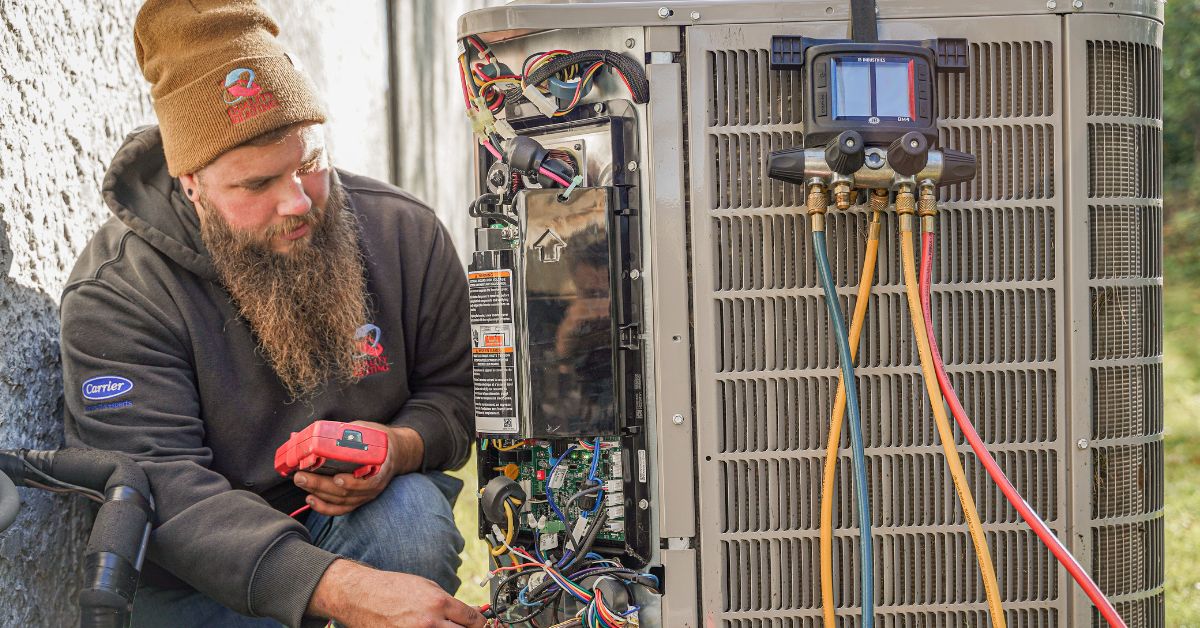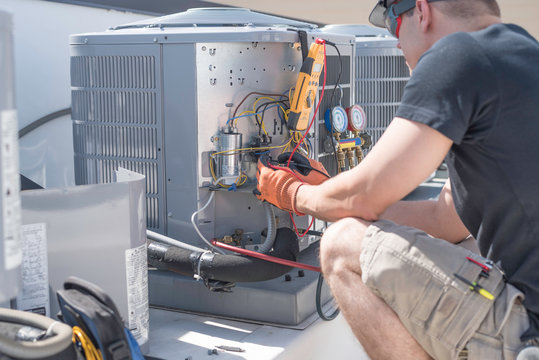Comprehending Cooling And Heating: Typical Issues of AC Devices and Their Solutions
Heating and cooling systems play an important function in preserving indoor comfort. Air conditioning units frequently run into usual problems that can hinder their efficiency. Issues like inadequate cooling, unusual noises, and regular biking can suggest much deeper mechanical concerns. In addition, water leakages and unpleasant odors can endanger air top quality. Comprehending these challenges and their services is necessary for effective upkeep. What steps can homeowners take to assure their a/c units operate efficiently?
Inadequate Air Conditioning Performance
What creates insufficient cooling performance in an a/c system? Several aspects can add to this problem. A typical reason is a filthy air filter, which limits air movement and minimizes cooling down effectiveness. Additionally, reduced refrigerant levels as a result of leaks can prevent the system's capability to take in warm efficiently. Another prospective problem may arise from a malfunctioning thermostat, bring about inaccurate temperature analyses and improper air conditioning cycles. Obstructed or filthy condenser coils can additionally prevent warmth dissipation, additional affecting efficiency. Finally, ductwork issues, such as leakages or obstructions, can lead to unequal cooling throughout a space. Identifying these issues without delay is vital for maintaining ideal HVAC function and making sure a comfy indoor setting. Regular maintenance and examinations can help minimize these issues and improve the system's general performance.
Uncommon Sounds Coming From the Air Conditioning System
A range of unusual noises coming from an AC device can show underlying concerns that call for attention. Typical sounds include rattling, which may recommend loosened components or particles within the device. Hissing sounds typically direct to refrigerant leaks, compromising the system's effectiveness. A grinding audio could indicate damaged bearings or motor concerns, while a piercing squeal could signal a trouble with the compressor or a sliding belt.
Each of these sounds functions as an indication that something may be awry, potentially resulting in more substantial damage if not addressed without delay. Home owners must stay clear of overlooking these auditory signs and think about speaking with a certified cooling and heating professional for medical diagnosis and repair. Timely intervention can not just bring back performance however additionally prolong the lifespan of the device. Fix broken Air conditioner. Recognizing these sounds as indicators of problem is necessary for preserving peak air conditioning efficiency
Regular Cycling On and Off
Regular biking on and off can indicate ineffectiveness or malfunctions within a HVAC system, frequently referred to as short-cycling. This condition can cause raised energy usage and might trigger unneeded endure the device's components. Several variables can contribute to this issue, including an incorrectly sized air conditioning system, a malfunctioning thermostat, or filthy air filters. When an air conditioner unit is also large for the area, it cools also rapidly, triggering it to cycle often without effectively dehumidifying the air. If the thermostat is faulty, it might incorrectly indicate the device to activate and off. Furthermore, blocked or dirty air filters can limit air movement, prompting the system to work tougher and cycle more frequently. Attending to these problems quickly is vital to enhance performance, lengthen the life expectancy of the HVAC system, and keep perfect indoor comfort.
Water Leaks and Water Drainage Issues
Water leaks and water drainage problems can pose significant obstacles for cooling and heating systems, bring about potential damages and inadequacies. These troubles frequently originate from clogged up condensate drains pipes, which stop water from draining effectively and can lead to overflow. Furthermore, harmed drainpipe pans or incorrect installment may worsen these leaks, triggering water to build up in undesired locations.
Normal upkeep is vital to stop such issues; making certain that condensate lines are clear and drain frying pans are intact can alleviate the danger of leakages. House owners must regularly look for indicators of dampness around the device, as very early detection can prevent a lot more comprehensive damages. In cases where leakages are identified, instant activity is required, which may consist of clearing blockages or changing malfunctioning parts. Resolving water leakages and drain concerns not only protects the HVAC system but likewise keeps indoor air quality and comfort.
Bad Smells and Air High Quality Issues
Bad odors rising from cooling and heating systems can indicate major air high quality problems. Typical sources of these unpleasant scents consist of mold and mildew, mildew, or microorganisms development in the ductwork, commonly due to moisture build-up. If the system has an unpleasant, mildewy smell, it might indicate that the air filters are obstructed or that there is insufficient air flow, enabling contaminants HVAC contractor to flow. Furthermore, a burning smell may suggest electrical problems or overheating parts, calling for immediate focus.
House owners need to regularly replace air filters and schedule routine upkeep to guarantee peak air top quality. Utilizing an air purifier can also help remove odors and improve indoor air quality. If smells linger regardless of these measures, expert inspection and cleansing might be required to recognize and deal with underlying issues. air conditioner repair. Awareness of these odors is essential, as they can influence health and wellness and convenience in interior settings

Often Asked Questions
Just how Usually Should I Schedule Air Conditioning Upkeep?
It is advised to arrange air conditioning upkeep a minimum of yearly, preferably before the air conditioning period starts. Normal examinations can assist determine problems early, ensuring effective procedure and extending the life expectancy of the device.

What Is the Average Lifespan of an Air Conditioner Device?
The average lifespan of an air conditioning system usually varies from 15 to 20 years. Variables such as upkeep, use patterns, and environmental conditions can significantly affect this period, influencing general efficiency and performance gradually.
How Do I Pick the Right Dimension AC System for My Home?

What Are the Indications My A/c Unit Requirements Replacement?

Can I Install an Air Conditioner System Myself?
While installing an a/c unit oneself is feasible, it calls for technical knowledge and appropriate devices. air conditioner repair. Many individuals might deal with obstacles with installation, possibly leading to ineffectiveness or safety and security risks, making professional support suggested for perfect outcomes
Verdict
In summary, understanding usual HVAC troubles and their remedies is essential for maintaining efficient AC system performance. Addressing issues such as inadequate air conditioning, unusual sounds, regular biking, water leakages, and undesirable smells can substantially improve indoor convenience and air high quality. Regular upkeep, consisting of filter modifications and timely repair work, plays a considerable role in stopping these troubles. By remaining aggressive, property owners can ensure their heating and cooling systems run properly, ultimately extending the lifespan of their a/c devices.